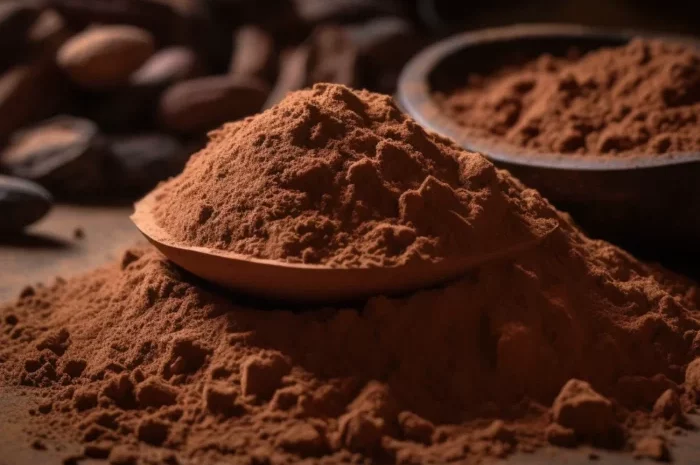Cacao powder is a popular ingredient known for its rich, chocolatey flavor and numerous health benefits. It is derived from cacao beans, which are the seeds of the cacao tree, Theobroma cacao. Cacao powder is often celebrated for being high in antioxidants, minerals, and vitamins. However, the question many people ask is, “How much cacao powder should I consume each day for health benefits?”
In this article, we will explore how much cacao powder is healthy to consume daily, along with the potential benefits and risks associated with eating it regularly. We’ll also discuss how to incorporate it into your diet safely.
What Is Cacao Powder?
Before diving into daily consumption, it’s important to understand what cacao powder is. Cacao powder is made by grinding cacao beans into a fine powder. The beans are fermented, dried, roasted, and then processed to remove the fat (cacao butter), leaving behind the solids which are ground into cacao powder.
Cacao powder is often confused with cocoa powder, but they are not the same. Cocoa powder is processed at higher temperatures and may contain added sugars, while cacao powder is raw and unprocessed, retaining more of its natural nutrients.
Nutritional Profile of Cacao Powder
Cacao powder is a nutritional powerhouse. Here’s what it contains per tablespoon (approximately 5-7 grams):
- Calories: 12-15
- Fat: 1 gram (mostly healthy fats)
- Protein: 1 gram
- Carbohydrates: 3 grams
- Fiber: 2 grams
- Magnesium: 27 milligrams (about 7% of the daily recommended intake)
- Iron: 0.4 milligrams (about 5% of the daily recommended intake)
- Antioxidants: Cacao is high in flavonoids, especially epicatechins, which are powerful antioxidants.
- Theobromine: A natural stimulant similar to caffeine but with milder effects.
The high antioxidant content of cacao powder can help protect the body from oxidative stress and reduce inflammation. Additionally, the magnesium, iron, and fiber make it a nutrient-dense addition to your diet.
Health Benefits of Cacao Powder
Cacao powder has several health benefits, which is why it’s often included in smoothies, desserts, and health supplements. Here are some of the top benefits:
Rich in Antioxidants Cacao powder is packed with antioxidants, which can help neutralize free radicals in the body. Free radicals are unstable molecules that can contribute to chronic diseases, aging, and inflammation. Antioxidants in cacao help prevent cell damage and support overall health.
Supports Heart Health The flavonoids in cacao powder have been linked to improved cardiovascular health. Studies suggest that these compounds can help lower blood pressure, improve blood flow to the brain and heart, and reduce the risk of heart disease by enhancing the flexibility of blood vessels.
Boosts Mood and Mental Health Cacao powder contains compounds like theobromine and phenylethylamine (PEA), which are thought to improve mood and increase feelings of well-being. PEA, in particular, is often referred to as the “love chemical” because it is associated with elevated mood and feelings of happiness.
Improves Cognitive Function Research has shown that the flavonoids in cacao may enhance cognitive function and help prevent cognitive decline as we age. The increased blood flow to the brain supports brain function, memory, and focus.
Provides Magnesium Magnesium is a vital mineral that plays a role in over 300 biochemical reactions in the body. Cacao powder is an excellent source of magnesium, which supports muscle function, energy production, and bone health.
Supports Weight Loss Some studies suggest that cacao powder may help in weight management. The fiber and fat content in cacao powder can help increase feelings of fullness, which may lead to reduced overall calorie intake. Additionally, cacao can help regulate blood sugar levels, preventing cravings for sweet or high-calorie foods.
How Much Cacao Powder Should You Eat Daily?
Now that you know the health benefits of cacao powder, the next question is: How much should you consume per day?
There’s no one-size-fits-all answer, as it depends on factors like your overall health, activity level, and how much other chocolate or cacao-containing foods you consume. However, a general guideline is to aim for 1-2 tablespoons (5-10 grams) of cacao powder per day. This amount is enough to enjoy the health benefits without overdoing it.
Here are some considerations when determining how much cacao powder is right for you:
1. Start with Small Amounts
If you’re new to cacao powder, it’s best to start with a small amount, like 1 teaspoon (about 3 grams) per day. This allows you to gauge how your body responds, especially since cacao contains stimulants like theobromine and caffeine, which may cause restlessness or anxiety in some individuals.
2. Consider Caffeine Sensitivity
Cacao contains theobromine, a natural stimulant related to caffeine, which can have mild stimulating effects. While the amount of theobromine in cacao powder is not as high as caffeine, if you are sensitive to caffeine, you may want to limit your intake or consume it earlier in the day to avoid interfering with sleep.
3. Adjust Based on Your Diet
If you already consume other sources of caffeine or stimulants (like coffee or energy drinks), you may want to limit your cacao powder intake to 1 tablespoon per day. On the other hand, if you’re using cacao to replace sugary snacks, you may benefit from consuming up to 2 tablespoons per day.
4. Consider Your Nutritional Needs
If you’re looking to boost magnesium or antioxidants, adding 1-2 tablespoons of cacao powder to your diet each day can help meet your nutritional goals. If you’re using it as a supplement for mood or heart health, keep your intake consistent but not excessive.
Potential Risks of Too Much Cacao Powder
While cacao powder has numerous health benefits, eating too much can lead to certain side effects. Here are some potential risks to keep in mind:
Caffeine Sensitivity As mentioned earlier, cacao contains theobromine, which can cause symptoms similar to caffeine, including jitteriness, increased heart rate, or restlessness. If you are sensitive to caffeine or have a history of anxiety, you may want to limit your intake of cacao powder.
Calorie Overload While cacao powder is relatively low in calories, consuming large amounts can contribute to excess calorie intake. For example, 2 tablespoons of cacao powder contain about 24 calories, and if you add it to high-calorie smoothies or desserts, the calories can quickly add up.
Possible Digestive Issues Cacao powder is high in fiber, which can promote digestive health. However, too much fiber at once can cause bloating, gas, or constipation. It’s important to drink plenty of water and gradually introduce cacao powder into your diet.
High Oxalate Content Cacao contains oxalates, which can interfere with calcium absorption and contribute to kidney stone formation in some individuals. If you are prone to kidney stones or have been advised to follow a low-oxalate diet, you may need to limit cacao intake.
Potential for Heavy Metal Contamination Like many plant-based products, cacao can absorb heavy metals like lead and cadmium from the soil in which it is grown. While the levels in cacao powder are generally considered safe for moderate consumption, consuming excessive amounts over time could expose you to higher levels of these metals.
How to Incorporate Cacao Powder Into Your Diet
There are many ways to include cacao powder in your diet. Here are some ideas:
Smoothies: Add 1-2 tablespoons of cacao powder to your daily smoothie for a chocolatey twist.
Baked Goods: Use cacao powder in recipes for healthy brownies, muffins, or energy bars.
Hot Chocolate: Mix cacao powder with warm milk (or dairy-free alternatives) and sweetener for a cozy, healthy hot chocolate.
Oatmeal: Stir cacao powder into your morning oatmeal for added flavor and nutrition.
Energy Balls: Make no-bake energy balls using cacao powder, nuts, dates, and other healthy ingredients.
Conclusion
Cacao powder is a nutritious superfood that can be a healthy addition to your diet. For most people, consuming 1-2 tablespoons (5-10 grams) per day is a safe and effective way to reap its health benefits. However, it’s important to consider factors like caffeine sensitivity, overall calorie intake, and any potential digestive concerns. As with any food, moderation is key.
If you’re looking for a natural way to improve your heart health, boost mood, or increase antioxidants in your diet, cacao powder is a great choice. Just remember to enjoy it in moderation, and always listen to your body’s response when incorporating new foods into your routine.
Related topics:

























